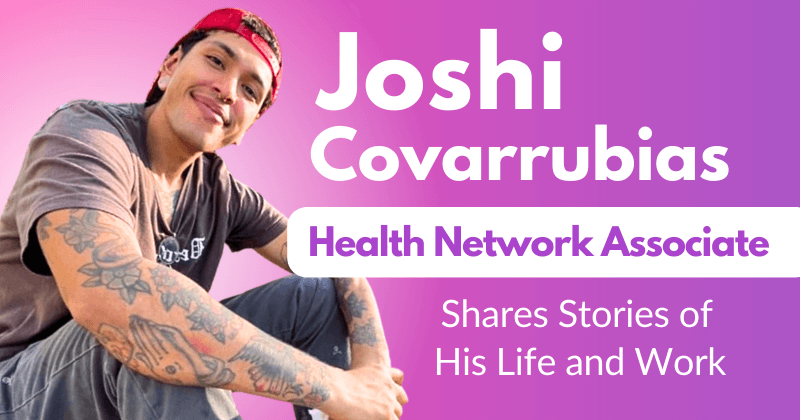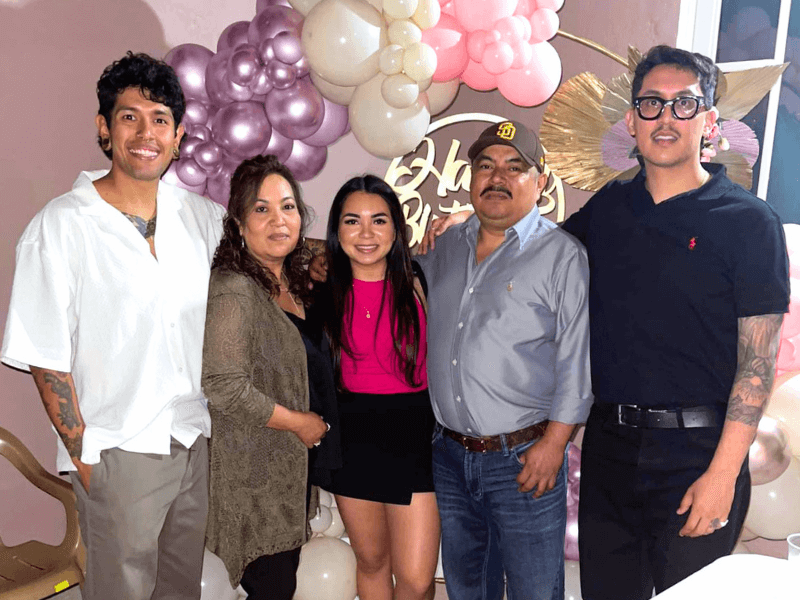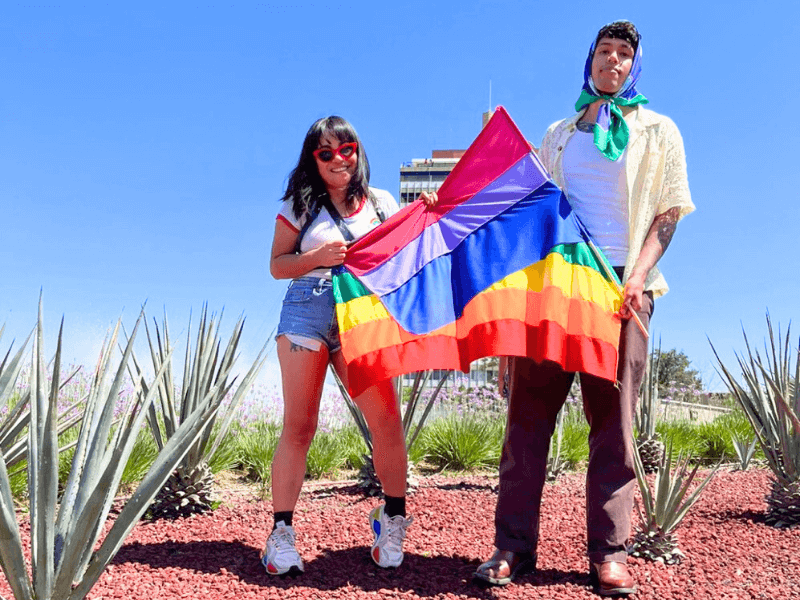Joshi Covarrubias, Health Network Associate, Shares Stories of His Life and Work

[Editor’s Note: Our Health Network Associates save lives, every week. They provide critical, hands-on case management for migrants and asylum seekers with ongoing health needs that may otherwise be unable to access care during and after their migration. Read other Associates’ stories: Enedelia, Saul, Alma, Robert, Norma, and Nestor.]
“He is such a kind and accepting person and that reflects onto his work. He truly is just so attentive to the patients and their needs, it's lovely to see and hear during [Health Network] meetings. There's a reason the patients have wanted to name their children after him in the past.” - Camila Velasquez, Health Network Associate
“I think Joshi is one that connects best with his patients because he always has great and funny stories to tell us that happen with his interactions which just shows how comfortable he is with them and vice versa.” - Nestor Reyes, Health Network Associate
Joshi Covarrubias, one of our Health Network Associates, joined our team in 2020. In that time, he has handled a significant number of patient cases, helping to ensure access to prenatal care for migrants and asylum seekers. With a passion for health and a personal connection to migration, Joshi provides empathetic and critical case management for our patients. Here, we provide a glimpse into the life and work of one Health Network Associate, Joshi Covarrubias. This interview has been edited for brevity and clarity.
I want to start with a little bit about your childhood. Where are you from?
I was born in this small pueblo called Santa Ritas in the state of Jalisco in Mexico. I lived there until I was six years old. Then we immigrated from Mexico to the US. I grew up in a good number of places. I lived in Michigan for a little bit and then we moved to the valley in Texas. And then from the valley, we moved to Atlanta, GA and then we moved to Sacramento, CA before we ended up moving back to the west side of Michigan and then that's basically where I grew up. The majority of my childhood and a good chunk of my adulthood was spent in Michigan.

Joshi (left) and his family gather for a birthday.
What was the reason for all that moving?
My mom was trying to find her place, checking out different states. She dated some different people, so we often went wherever they went. But for most of it was just us trying to find, like, our home. So we tried different places and then ended up settling in Michigan. It’s a good place – and my mom has family there.
Coming to the US at age six, how was the language adjustment for you?
It was difficult because all I spoke was Spanish. When I came to the US, at least the schools that I went to in West Michigan, didn't have ESL programs established yet, so it was really tough. I just got shoved into classes and they kind of just expected me to learn without giving me any help.
When did you feel like you started feeling comfortable with the English language?
Around the age of seven. I had the responsibility of being my family's translator, because I was in school and learning things in English. So I kind of felt rushed to learn the language. My family needed someone to help translate at the doctor's office, or anywhere else, right? I got to the US around six, and I want to say around seven or eight I was already fluent in English. At that age you absorb everything, so that's what I think it was like for me.
When did you join up with MCN?
I moved to Austin at the end of 2019 and that's when I started looking for jobs in the area. I got hired December of 2019.
So you just had a tiny little period of working in the office before COVID. Did you attend college before you moved to Austin?
I did. I attended Cornerstone University. It's a small university in West Michigan. I played soccer there; I was there on a soccer scholarship. I got my degree in kinesiology. It has so many different names, some people and some schools call it exercise science, some schools call it kinesiology. But it's basically the study of human movement, and it's one of those so-called steppingstone degrees that schools love to have. I have a Bachelor’s in kinesiology with an emphasis on pre-physical therapy. So as of right now I am working and studying, taking more classes to be able to apply for physical therapy schools. I have two more classes to finish and then I’ll be applying for grad schools.
Are there any you’re hoping to get into in particular?
I've been speaking to the enrollment specialist at Bowling Green. I have a handful of them that I wouldn't mind getting into, but I really want to go to Bowling Green.
You said that you got into school on a soccer scholarship, so I assume you played all through middle and high school, and all that. Do you still play today?
I do! I still play soccer. Not as much as I did when I was younger. I play more recreationally now. I try to stay away from super competitive soccer. Just because I’ve been there, and I did that. Most of high school and college was just me stressing out because I'm super competitive. It takes a lot out of me.
But I do compete in other sports besides soccer. I also grew up boxing. My two older brothers were semi-pro and professional boxers out of Grand Rapids, MI. I tagged along with them whenever they were in the gym. I competed in the Golden Gloves tournament, which is the tournament that helps people make it up into amateurs and then pros. I only did one. Other than that, I also do Muay Thai, which is Thai kickboxing, and I do Brazilian jujitsu, which is grappling. It’s kind of like wrestling, but with like a lot more steps.
So how did you initially hear about MCN when you first moved to Austin?
When I moved to Austin, I was looking for jobs with my degree, and I did find a couple.
But when I was looking for those jobs, MCN was also came up in the search for some reason. Growing up I also wanted to work with the immigrant population in the US. A lot of my family members were migrant workers. They worked in the blueberry fields in Michigan, and then during the winter they’d go down to Texas and work in Texas. And my stepdad, throughout the seasons, would move to different states to work at different construction sites and things like that. So I know a lot about migrant workers and it’s been part of my family.
I volunteered at different Hispanic centers around Grand Rapids, MI, helping undocumented workers [secure] their rights. So, I've always wanted to work at a place that involved immigrants and migrant workers. So that's kind of how MCN beat out the other jobs.

Joshi showing support during Pride Month in Mexico.
Now, you’re not longer in Austin or Michigan -- you're living in Mexico. How long have you been there?
I have been in Mexico five months now.
Did you get to spend any time in Mexico when you were growing up, or is this new for you?
So, I lived here until I was about six years old and then we used to visit every year or every other year at least. We would come to visit my grandma. My town, my pueblo, throws this party in May here that lasts a week long. They bring different groups, and they play music. In the mornings, they do indigenous dances and they have parades and things like that. At night, they have music and -- it's just a crazy thing. It's really interesting because it's a really small, religious Catholic town, but these people, I don't know where they get the energy, but they party from like 11 AM to six in the morning for an entire week. They do this for an entire week. It all starts at 11, and the last band is done playing at around 5 AM, and then everyone stays out there for like an hour or two. Then we all just take a nap and then do it again the next day -- for an entire week.
Could you tell me a bit about one of the more frustrating cases you've experienced at Health Network?
I feel like most of my frustration that comes from this type of work is from prenatal cases. That’s where most of my hair loss comes from, cause I'm just pulling my hair out of my head. Once a patient gets to a specific period in their pregnancy, clinics often won't see them, they won't accept them if they're past 25 weeks. So we end up calling clinic after clinic after clinic in that same general area and they're all denying us and they say the same thing. “No, if this person hasn't had any prior care, we can't get them in, blah, blah, blah.” It can be really hard to get them into care. That’s a really hard thing because then I have to tell the patient, “the clinic told me that you're too far along and they won't accept you into care because you have had no prior care.”
I feel bad for them because I don't want them to feel like it was their fault because they didn’t get care in whatever country they came from. So, it makes me feel bad, and then it makes me frustrated. Sometimes I'll get a patient from the respite center, that's as early as, like, five weeks, but often I get patients as far [along] as six to seven months. Sometimes, I'll get patient, that's eight months in already. And once they're at that seven to eight month, there’s often no way to get them care.
I try. But there's often no way. So, I have to find the nearest hospital emergency room that's near them and I tell them to keep monitoring themselves for any type of emergency. I tell them, if anything comes up, “Please just go to a hospital. They're going to take you in, you don't need to pay up front, and if you're worried about costs, we'll figure something out. We'll talk to the finance program.” Because that's another hinderance. They’re scared to go to the hospital because of the bill they're going to get. So, I talk to them about that.
I did have a case, it was a prenatal case, where the anchor contact was the patient’s cousin who was taking care of our patient. He needed to take the patient to the emergency room because she was feeling pain, and I told him – “You need to take them to emergency room. It’s really important.” And they were worried about the cost. He was saying, “I don't have any money. I'm the one that's kind of like providing for this patient financially,” which I totally understand! Finance is a big thing.
But I had to tell him that I understand his concerns about his finances, but that this is really important, that it could be a life and death thing. The life of his cousin is more important than the finances right now. I told him that I'd connect him with the financial team. I'd connect him with a social worker at that hospital to set something up with the mother so he wouldn’t have to worry about anything. But I was telling him that the first priority is to get her to the hospital.
I had to ask other Health Network Associates for help and advice on what I should say to them. At the end of the day, I ended up sending him a message explaining that I understand the finance side of things and I didn’t want to downplay that. I also have fears about going to any sort of doctor because of my finances, but I stressed that it was really important for his cousin’s well-being, and for her life, that she goes right now. I left it at that, and I never heard back from that patient or that anchor contact after that.
Hopefully it went alright.
Yeah, hopefully. I reached out to them after that and I asked them how it went and I never got a response from anybody. I was calling and left messages to tell him that I can call the clinic and have them set up something else for your finances or set up a payment program or see if there’s any sort of insurance that she can apply for. But I just never got a response.
That was one of the harder cases. And sometimes you get that. People are just afraid for their finances, and it becomes a hindrance to them getting care.
I want to ask if there are any standout Health Network cases that you’ve had over the years that really made it feel like you’re doing a job that matters to you.
I have a handful, but one that really sticks out for me was one that I had when I first started working at MCN. I had a [young] patient who had developmental delays and hydrocephalus. That case involved a bunch of specialists and personally, [it reminded me of myself] growing up. My mom hurt her back working. And I was in charge of finding back specialists and surgeons and things for my mother at the age of 13, and it was really difficult. So, it reminded me of how difficult it was for me. And I spoke English when I was younger. It’s hard, especially for our patients because they often don’t speak any English.
This case really stood out to me because of the difficulties of having to speak with these doctors and getting the patient into care and scheduling it all. Especially with things that as sensitive as the type of care that she needed. It made me realize how important this job is. Sometimes when I feel like I’m not necessarily doing enough, I’ll sit there and say to myself, “The problem is way bigger than this. I should be doing something that helps on a larger scale. I don't know if I’m actually making an impact.” But then I remember some of the cases that I had, especially this case, and I think that even if it's not necessarily helping at a global level, it's still impacting these individual lives, and that's enough. That's enough for me.
- Log in to post comments